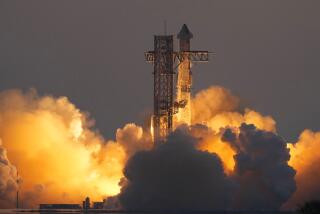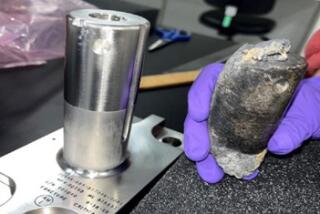Nervous Moments as 500-Pound Space Junk Nearly Hits Satellite
- Share via
KENNEDY SPACE CENTER, Fla. — An ozone-measuring satellite released by space shuttle Discovery came frighteningly close to a 500-pound piece of space junk that could have smashed it to pieces.
The discarded rocket motor passed within 1 1/2 miles of the German-built satellite, worth tens of millions of dollars.
Discovery and its crew of six were 51 miles ahead of the satellite at the time Monday night and were in no danger, German mission manager Konrad Moritz said.
If the rocket motor and the 7,700-pound satellite had collided--both are hurtling around Earth at 17,500 mph--it could have been disastrous for the satellite.
The U.S. Space Command, which tracks junk in orbit, knew the object was out there and kept NASA informed. As the piece drew near, engineers variously predicted it would pass as close as half a mile or 3 1/2 miles.
Because of that wide margin of uncertainty, scientists nervously watched computer screens. Ground controllers were prepared to fire tiny thrusters on the satellite to slowly maneuver it out of harm’s way if necessary.
There is no danger of the space junk coming close again, said NASA spokesman Kyle Herring. The astronauts plan to retrieve the satellite Saturday, two days before their mission ends.
Discovery’s crew spent Tuesday taking more pictures of the Hale-Bopp comet with an ultraviolet telescope.
Meanwhile, U.S. space officials said Tuesday that there is more bad news about the Russian space station Mir.
Its crew is down to only 1 1/2 to two months of drinking water and could run out if a NASA shuttle doesn’t get there on time in late September.
A Russian cargo ship also is supposed to take up water in early October, but that might be too late.
The crew can no longer rely on a humidity recycling system because the water may be contaminated by antifreeze fumes from leaks months ago in the cooling system. Space officials won’t know for sure whether the water is safe until returning cosmonauts bring back a sample later this week.
News of the dwindling water supply came on top of continued problems with Mir’s air supply: Its new oxygen generator won’t work, possibly because of a clog.
The four Russians and American Michael Foale are relying on solid-fuel canisters to generate oxygen, but they are not exactly reliable. One such canister burst into flames in February.
More to Read
Sign up for Essential California
The most important California stories and recommendations in your inbox every morning.
You may occasionally receive promotional content from the Los Angeles Times.













